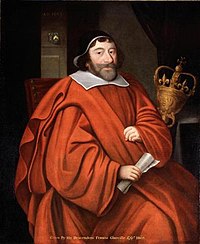John Glanville

Sir John Glanvillethe younger (1586 – 2 October 1661), was an English politician who sat in theHouse of Commonsat various times between 1614 and 1644. He wasSpeaker of the English House of Commonsduring theShort Parliament.He supported theRoyalistcause in theEnglish Civil War.
Life[edit]
Glanville was the son ofSir John Glanville the elder,ofBroad Hintonin Wiltshire. His father was a judge and Member of Parliament. Glanville was brought up as an attorney, but enteredLincoln's Innand wascalled to the baron 6 February 1610. He wasRecorderofPlymouthfrom 1614.[1]He was electedMember of ParliamentforLiskeardin 1614. In 1621 he was elected MP forPlymouthand was re-elected in 1624. He was secretary to the Lord Admiral of the Fleet during theGeorge Villiers, 1st Duke of Buckingham'sassault on Cádizin 1625, and managed several of the articles of his impeachment over the next three years. He was re-elected MP for Plymouth in 1625 and opposed the Crown in the 1620s, preparing a protest against the dissolution of Parliament in 1625. He was re-elected MP for Plymouth in 1626 and 1628, and sat until 1629 when King Charles decided to rule without parliament for eleven years. At some time he was proctor for the dean and chapter of Windsor.[1]
In January 1630, Glanville became areaderof his Inn. He becameserjeant-at-lawon 20 May 1637 and bencher of his Inn on 14 June 1637. He was Recorder ofBristolfrom 1638. In April 1640 he was elected MP forBristolin theShort Parliamentwhen he served Speaker. He spoke so strongly againstship moneyduring his term as Speaker that the court party contrived to prevent him coming down to the House on the day the Short Parliament was dissolved. Nevertheless, he becameKing's Serjeanton 6 July 1640 and from then onwards he supported theKing.In November 1640, he was re-elected MP for Bristol for theLong Parliament.He wasknightedon 7 August 1641.[1]
He sat in the King's Parliament at Oxford and was awardedDCLfrom theUniversity of Oxfordon 31 January 1644.[2]In January or September 1644, he was disabled from sitting in parliament. He was also replaced as recorder of Bristol byEdmund Prideaux.In 1645, he was imprisoned by Parliament in theTower of Londonuntil he was released on 7 July 1648. He was fined £2,320 for his support for the King. In 1659, he was elected MP forSt Germansin theThird Protectorate Parliamentbut was disqualified.[1]
Following the Restoration, Glanville was reappointedKing's Serjeanton 6 June 1660.[1]
Marriage and issue[edit]
Glanville married Winifred Bourchier, daughter of William Bourchier ofBarnsley,Gloucestershire in about 1613. He had sons:
- Francis Glanville, aRoyalistsoldier in theEnglish Civil War.[3]Colonel Francis Glanville was killed in 1645 when aParliamentarianforce besieged the Royalist-held town ofBridgwaterin Somerset.[4]His monument in the church atBroad Hintonis a standing alabaster statue, wearing armour and holding the metal staff of a standard; his real armour is displayed above the monument.[4]
- William Glanville, heir to his father, who was MP forCamelford(died 1680)[3]
- Julius Glanville
Sources[edit]
- Baggs, A.P.; Crittall, Elizabeth; Freeman, Jane; Stevenson, Janet H (1983). Crowley, D.A. (ed.)."Victoria County History: Wiltshire: Vol 12 pp. 105–119 – Parishes: Broad Hinton".British History Online.University of London.Retrieved1 April2017.
- Pevsner, Nikolaus;Cherry, Bridget (revision) (1975).The Buildings of England: Wiltshire.Harmondsworth:Penguin Books.pp. 146–147.ISBN0140710264.
References[edit]
- .Dictionary of National Biography.London: Smith, Elder & Co. 1885–1900.
- D. Brunton and D. H. Pennington,Members of the Long Parliament(London: George Allen & Unwin, 1954)
- Cobbett's Parliamentary history of England, from the Norman Conquest in 1066 to the year 1803(London: Thomas Hansard, 1808)
- Maija Jansson (ed.),Proceedings in Parliament, 1614 (House of Commons)(Philadelphia: American Philosophical Society, 1988)
External links[edit]
- 1586 births
- 1661 deaths
- Politicians from Wiltshire
- English MPs 1614
- English MPs 1621–1622
- English MPs 1624–1625
- English MPs 1625
- English MPs 1626
- English MPs 1628–1629
- English MPs 1640 (April)
- English MPs 1640–1648
- English knights
- Members of the pre-1707 English Parliament for constituencies in Cornwall
- Speakers of the House of Commons of England
- Knights Bachelor
- Serjeants-at-law (England)
- Members of the Parliament of England for Plymouth

